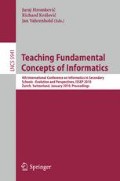Abstract
This study compares the effect of using tangible robots to using visual representations for introducing seventh graders (12 to 13 year old) to computer programming. The impact was measured on learning outcome, self-efficacy, class feedback and attitudes towards STEM (science, technology, engeneering and mathematics) topics. Results show that using robots to learn computer programming is beneficial, although no overall effect towards STEM topics could be shown. A huge gender gap in regard to subjective technical competence (STC) was found that negatively affected the participants’ performance. We provide approaches to leverage this gap and increase learning outcome and interest in STEM topics.
Access this chapter
Tax calculation will be finalised at checkout
Purchases are for personal use only
Preview
Unable to display preview. Download preview PDF.
References
Leszczensky, M., et al.: Bildung und Qualifikation als Grundlage der technologischen Leistungsfähigkeit Deutschlands. Bericht des Konsortiums Bildungsindikatoren und technologische Leistungsfähigkeit. Studien zum deutschen Innovationssystem, Nr. 8-2008 (2008)
Schinzel, B.: Informatik und Geschlechtergerechtigkeit in Deutschland - Annäherungen. In: Gender and Science. Perpektiven in den Natur- und Ingenieurwissenschaften. Bielefeld, pp. 127–145 (2007)
Bandura, A.: Self-efficacy: Toward a unifying theory of behavioral change. Psychological Review 84(2), 191–215 (1977)
Liu, L., Grandon, E.E.: How performance and self-efficacy influence the ease of use of object-orientation. In: Proceedings of the 36th Hawaii International Conference on System Science (HICSS 2003), Big lsland, HI, January 2003, pp. 327–336 (2003)
Brosnan, M.J.: The impact of computer anxiety and self-efficacy upon performance. Journal of Computer Assisted Learning 14, 223–234 (1998)
Arning, K., Ziefle, M.: Understanding age differences in PDA acceptance and performance. Computers in Human Behavior 23(6), 2904–2927 (2007)
Busch, T.: Gender differences in self-efficacy and attitudes toward computers. Journal of Educational Computing Research 12, 147–158 (1995)
Zeldin, A., Pajares, F.: Against the Odds: Self-Efficacy Beliefs of Women in Mathematical, Scientific, and Technological Careers. American Educational Research Journal 37(1), 215–246 (2000)
Ziefle, M., Jakobs, E.-M.: Wege zur Technikfaszination. In: Sozialisationsverläufe und Interventionszeitpunkte. Springer, München (2009)
Petersen, U., et al.: Roberta Abschlussbericht, BMBF Projekt (2007), http://www.iais.fraunhofer.de/fileadmin/images/pics/Abteilungen/AR/PDF/Abschlussbericht_Roberta_2007-11-21.pdf (accessed March 2009)
Westram, H.: Schule und das neue Medium Internet - nicht ohne Lehrerinnen und Schülerinnen. Thesis (Dr.), Universität Dortmund (1999)
Schelhowe, H.: Interaktivität der Technologie als Herausforderung an Bildung. Zur Gender-Frage in der Informationsgesellschaft. Ruhr Universität Bochum (2004), http://www.ruhr-uni-bochum.de/fiab/pdf/jahrbuch/j17a5.pdf (accessed March 2009)
Hartmann, S., Schecker, H.: Bietet Robotik Mädchen einen Zugang zur Informatik, Technik und Naturwissenschaft? – Evaluationsergebnisse zu dem Projekt Roberta. Zeitschrift für Didaktik der Naturwissenschaften, Jg. 11 (2005)
Monroy-Hernández, A., Resnick, M.: FEATURE: Empowering kids to create and share programmable media. Interactions 15(2), 50–53 (2008)
Papert, S.: Mindstorms:Children, Computers and Powerful Ideas. Basic Books, Inc., New York (1980)
Beier, G.: Locus of control when interacting with technology (Kontrollüberzeugungen im Umgang mit Technik). Report Psychologie 24, 684–693 (1999)
Hyde, J., et al.: DIVERSITY: Gender Similarities Characterize Math Performance. Science 321(5888), 494–495 (2008)
Ziefle, M., Bay, S.: How to overcome disorientation in mobile phone menus: A comparison of two different types of navigation aids. Human Computer Interaction 21(4), 393–432 (2006)
Cassidy, S., Eachus, P.: Developing the computer user self-efficacy (CUSE) scale: investigating the relationship between computer self-efficacy, gender and experience with computers. Journal of Educational Computing Research 26(2) (2002)
Author information
Authors and Affiliations
Editor information
Editors and Affiliations
Rights and permissions
Copyright information
© 2010 Springer-Verlag Berlin Heidelberg
About this paper
Cite this paper
Brauner, P., Leonhardt, T., Ziefle, M., Schroeder, U. (2010). The Effect of Tangible Artifacts, Gender and Subjective Technical Competence on Teaching Programming to Seventh Graders. In: Hromkovič, J., Královič, R., Vahrenhold, J. (eds) Teaching Fundamentals Concepts of Informatics. ISSEP 2010. Lecture Notes in Computer Science, vol 5941. Springer, Berlin, Heidelberg. https://doi.org/10.1007/978-3-642-11376-5_7
Download citation
DOI: https://doi.org/10.1007/978-3-642-11376-5_7
Publisher Name: Springer, Berlin, Heidelberg
Print ISBN: 978-3-642-11375-8
Online ISBN: 978-3-642-11376-5
eBook Packages: Computer ScienceComputer Science (R0)

